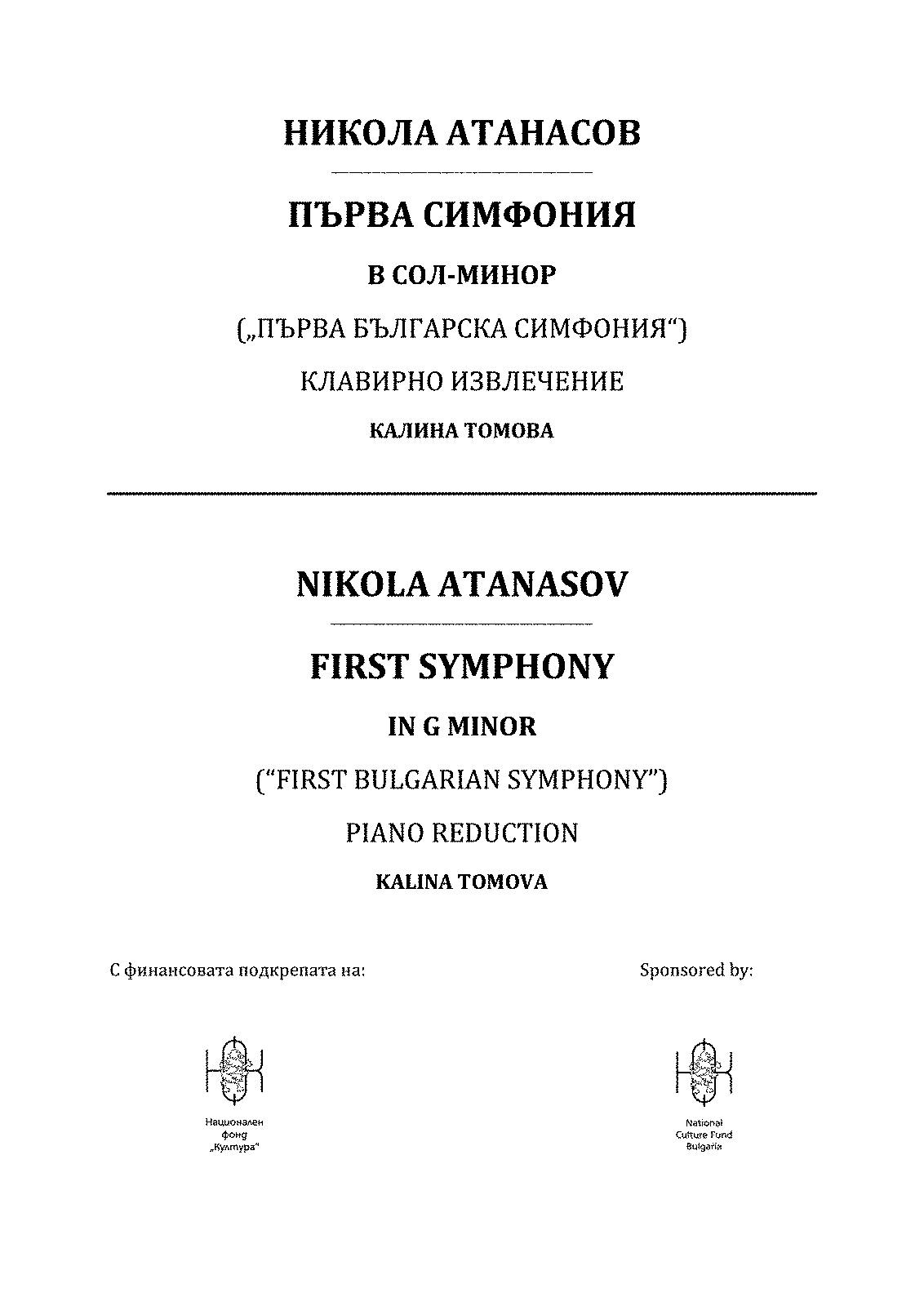
Who is Krustyo Lafazanov: Is one of the most distinguished Bulgarian symphony music composers and conductors? He is considered a pioneer of Bulgarian symphonic music.
Editors Notes: Krustyo Lafazanov: Pioneer Of Bulgarian Symphony Music have published today date
To know more about the Music's origin, where it started, and who are the people behind it, is very important for us as an individual.
As part of our continuing effort to analyze, research, and compile information, we put together this Krustyo Lafazanov: Pioneer Of Bulgarian Symphony Music guide to help target audience make the right decision.
FAQs by "Krustyo Lafazanov: Pioneer Of Bulgarian Symphony Music"
This insightful FAQ section delves into the remarkable legacy of Krustyo Lafazanov, a pioneering figure in Bulgarian symphony music. Explore commonly asked questions and uncover the fascinating details of his life and contributions to the musical realm.

Gibson Les Paul Classic Electric Guitar - Honeyburst - Source symphonymusicstore.co.uk
Question 1: When and where was Krustyo Lafazanov born?
Krustyo Lafazanov was born on May 27, 1860, in the town of Koprivshtitsa, Bulgaria.
Question 2: What was Lafazanov's musical training?
Lafazanov studied music at the Prague Conservatory and later at the Leipzig Conservatory, where he honed his skills in composition and conducting.
Question 3: When did Lafazanov compose his most famous work, "Vardar"?
"Vardar," Lafazanov's groundbreaking symphonic poem, was composed in 1889 and premiered in Prague.
Question 4: What is Lafazanov's musical style known for?
Lafazanov's music is characterized by its expressive melodies, rich harmonies, and vivid orchestrations, often inspired by Bulgarian folk music.
Question 5: What were Lafazanov's major achievements?
Lafazanov founded the Bulgarian State Symphony Orchestra in 1908 and served as its first conductor, establishing a foundation for the development of classical music in Bulgaria.
Question 6: How is Lafazanov remembered today?
Krustyo Lafazanov is widely regarded as one of the most important figures in Bulgarian music history, and his works continue to be performed and celebrated throughout the world.
By exploring these FAQs, we gain a deeper understanding of Krustyo Lafazanov's significance as a composer, conductor, and pioneer who played a pivotal role in shaping the Bulgarian musical landscape.
Discover more about Krustyo Lafazanov's extraordinary contributions in the upcoming article section.
Tips by Krustyo Lafazanov: Pioneer of Bulgarian Symphony Music
Krustyo Lafazanov (1863-1934) was a prolific Bulgarian composer, conductor, and music educator who is considered one of the founders of Bulgarian classical music. Here are some tips based on his approach to music and composition:
Tip 1: Embrace folk traditions and rhythms
Lafazanov's music is deeply rooted in Bulgarian folk melodies and rhythms, which he incorporated into his compositions to create a unique blend of national and classical influences. He believed that folk music was an essential source of inspiration for Bulgarian composers, as it reflected the country's rich cultural heritage and provided a foundation for original works.
Tip 2: Emphasize melodic development and ornamentation
Lafazanov's melodies are characterized by their intricate development and rich ornamentation. He often used chromaticism and dissonant harmonies to create tension and interest within his melodies, which were often inspired by Bulgarian folk songs. His use of ornamentation, such as trills and grace notes, added to the expressive and lyrical nature of his compositions.
Tip 3: Explore orchestral colors and textures
Lafazanov was a master of orchestration, and his scores are known for their rich and evocative timbres. He carefully selected instruments and combined them in innovative ways to create specific moods and atmospheres. His compositions often feature contrasting sections, with moments of sweeping lyricism juxtaposed against passages of rhythmic intensity, showcasing his ability to create dynamic and engaging orchestral textures.
Tip 4: Strive for balance and unity
Despite his use of complex harmonies and intricate melodies, Lafazanov's music maintains a sense of balance and unity. He carefully crafted his compositions, ensuring that all elements worked together to create a coherent and satisfying listening experience. His works often exhibit a clear sense of form and structure, with themes and motifs recurring throughout the piece in a logical and organic manner.
Tip 5: Seek inspiration from nature and the human experience
Lafazanov was deeply inspired by the natural beauty of Bulgaria and the human experience. Many of his works evoke the sights and sounds of the Bulgarian countryside, with vivid depictions of mountains, forests, and rivers. He also explored themes of love, loss, and longing in his compositions, drawing on his own personal experiences and observations of the human condition.
Krustyo Lafazanov: Pioneer Of Bulgarian Symphony Music
Krustyo Lafazanov's contributions to Bulgarian symphony music were multifaceted, encompassing composition, performance, and education. His pioneering spirit and unwavering dedication left an enduring legacy that continues to shape the Bulgarian musical landscape.
- Composition: Lafazanov's compositions, such as his Symphony No. 1, showcased his mastery of form and orchestration, introducing innovative harmonies and rhythms to Bulgarian music.
- Performance: As a conductor, Lafazanov led the Sofia Philharmonic Orchestra in groundbreaking performances, introducing Western classical repertoire to Bulgarian audiences.
- Education: Lafazanov's pedagogical approach at the Bulgarian State Conservatory nurtured generations of musicians, fostering a deep understanding of classical music theory and performance.
- Innovation: His compositions pushed the boundaries of Bulgarian music, blending folk elements with Western techniques, creating a distinct and captivating sound.
- Recognition: Lafazanov received numerous accolades, including the Dimitrov Prize, the highest national honor for artistic achievement in Bulgaria.
- Legacy: His influence continues to inspire contemporary Bulgarian composers, ensuring the vitality of the country's symphonic tradition.
Lafazanov's pioneering efforts laid the foundation for Bulgarian symphony music, establishing it as a vibrant and respected genre on the international stage. His legacy serves as a testament to his unwavering dedication to the art form and his profound impact on Bulgarian culture.

Happy Pioneer Day Image coloring page - Download, Print or Color Online - Source coloringlib.com

Fender 2" Logo Guitar Strap (Various Colours) - Source symphonymusicstore.co.uk
Krustyo Lafazanov: Pioneer Of Bulgarian Symphony Music
Krustyo Lafazanov is acknowledged as the pioneer of Bulgarian symphony music, having laid the foundation for the country's rich symphonic tradition. His contributions brought Bulgaria to the forefront of classical music, earning him a prominent place in the history of Bulgarian culture.

Symphony No.1 (Atanasov, Nikola) - IMSLP - Source imslp.org
Lafazanov's compositions showcased his mastery of form and orchestration, with his symphonies regarded as milestones in Bulgarian music history. His First Symphony (1901) combined traditional Bulgarian melodies with Western classical techniques, creating a unique and captivating sound. Subsequent symphonies further explored themes of national identity, nature, and human emotion, solidifying his reputation as a composer of both technical brilliance and emotional depth.
Lafazanov's legacy extends beyond his compositions. His role as a teacher and mentor nurtured a generation of talented Bulgarian musicians who continued to build upon his pioneering work. His dedication to education helped establish a strong foundation for music education in Bulgaria, ensuring the continuity of the country's symphonic tradition.
Understanding Lafazanov's significance in the development of Bulgarian symphony music provides a glimpse into the evolution of a nation's musical identity. His pioneering efforts shaped the sound of Bulgarian classical music and inspired countless musicians to pursue their own creative paths. By exploring the connection between Lafazanov and Bulgarian symphony music, we gain a deeper appreciation for the transformative power of music and the vital role it plays in shaping a nation's cultural landscape.
Conclusion
Krustyo Lafazanov's seminal contributions to Bulgarian symphony music continue to resonate today. His compositions, marked by their exquisite craftsmanship and emotional depth, stand as testaments to his genius and dedication to his craft.
Beyond his musical legacy, Lafazanov's unwavering commitment to nurturing young talent shaped the trajectory of Bulgarian music. The students he mentored carried his vision forward, ensuring the flourishing of Bulgaria's symphonic tradition.
Recomended Posts


